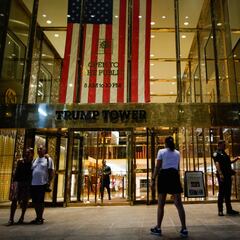Could Donald Trump run for President in 2024 if he is convicted of destroying classified documents?
In the aftermath of the search of his Mar-a-Lago residence, could a conviction prevent him from a return to the White House?


Former President Donald Trump’s Mar-a-Lago residence was searched on Monday morning in connection with an ongoing FBI investigation. Agents executed a raid on the Florida resort and seized classified documents which were reportedly taken from the White House.
It is part of a probe into Trump’s handling of documents while in office and concerns that the former President removed and destroyed sensitive materials. The raid marks a significant escalation of the investigation which first became public in February.
Trump penned an angry statement confirming that his property had been searched and he will likely feel the political effects of the raid for some time to come. He is expected to announce another run for the White House in 2024 but this could complicate those attempts. If found guilty of destroying presidential documents, he could theoretically be banned from running again.
"Raid on my home was not necessary or appropriate."
— USA TODAY (@USATODAY) August 9, 2022
Former President Donald Trump released a statement Monday saying federal agents searched Mar-a-Lago, his home in South Florida. pic.twitter.com/OoXCSKRZTw
What would happen if Trump is found guilty of destroying documents?
Trump’s hopes of a return to 1600 Pennsylvania Avenue could hit severe resistance if he is convicted of removing official records. An obscure criminal law bans sensitive documents from being taken from the White House and the penalty for doing so includes a potential disqualification from holing any federal office, including the presidency.
Section 2071 of Title 18 of the United States Code criminalises anyone in possession of government documents or records who “willfully and unlawfully conceals, removes, mutilates, obliterates, falsifies or destroys” them.
Anyone found guilty can face up to three years in prison and be subject to a fine. But, perhaps most crucially in the case of Trump, will also “be disqualified from holding any office under the United States.”
Donald Trump has given every signal that he’s running for president in 2024. The FBI search of his Mar-a-Lago home may only harden his resolve to jump in the race. https://t.co/0UV3CaTsxA
— NBC Politics (@NBCPolitics) August 9, 2022
Trump could reverse federal ban on appeal
While the criminal code states that anyone convicted can be barred from office, the legal basis for such a ban is unlikely to withstand appeal. The very same law was the subject of closer investigation in 2015 when it emerged that Hillary Clinton, the expected Democratic candidate for the 2016 presidential election, had conducted government business on a private email server.
Related stories
Republicans in Congress considered attempting to use the law to ban Clinton from office, but it was determined that it would not hold. Numerous legal scholars suggested that criminal laws cannot disqualify people from holding the office of President, as that power is specifically granted to Congress in impeachment hearings.
But although Trump is unlikely to be formally banned from running again as a result of the FBI investigation, a conviction would severely dent in his chances. In his successful 2016 campaign Trump repeatedly attacked Clinton for allegedly mishandling documents, something that she has never actually been convicted of.

